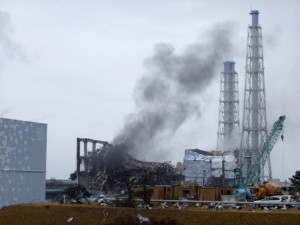The Fukushima Nuclear Power Plant: Just Another Massive Toxic Tort Waiting To Happen
It really is a testament to how many problems there are in this world of ours when a report about Japan’s nuclear regulator raising the severity level of the Fukushima nuclear power plant from 5 to 7 gets swept off the front pages in only a day. Call me crazy, but for some reason I just think that the potential that we could possibly suffer another nuclear meltdown on par with the Chernobyl disaster deserves a little bit more follow up than what we’re usually given in a 24-hour news cycle. I only say this because, though I’m not an expert in nuclear physics, it seems pretty likely that if the Fukushima plant were to blow, I’m pretty sure the subsequent fallout would affect more than those poor folks in Japan. It’s also important because it would also probably start a surge of lawsuits on par with modern day asbestos litigation.
I know, pretty bold statement, huh? However, unlike Glenn Beck and the other hosts over at Fox News, these words actually have a sound basis behind them (oh snap). In this case, for America anyway, it’s the doctrine of toxic (also known as environmental) torts that will likely be the basis for all these potential lawsuits.
 Toxic torts is an area of law that allows for recovery of medical and other damages related to the release of hazardous chemicals or substances into the environment that cause immediate or eventual health related illnesses. In essence, they are akin to a product liability lawsuit. Some person or company accidentally releases a product under their care which causes harm to everyone who comes in contact with it.
Toxic torts is an area of law that allows for recovery of medical and other damages related to the release of hazardous chemicals or substances into the environment that cause immediate or eventual health related illnesses. In essence, they are akin to a product liability lawsuit. Some person or company accidentally releases a product under their care which causes harm to everyone who comes in contact with it.
Applying this concept on a more massive scale, such as a potential Fukushima meltdown, may seem very complex. And of course it is. Should the unfortunate happen and the plant’s core actually explode, experts in the field of nuclear science estimate that the environmental damages could be immeasurable and last for many years to come. To give some sense of the scale of harm, the Chernobyl meltdown occurred in April 1986. Nearly 25 years later, the Ukrainian government still has in effect a 19-mile exclusion zone at the site of the accident due to nuclear contamination. In addition, like asbestos litigation, lawsuits regarding potential victims of Chernobyl’s fallout are still being litigated in European courts to this day.
But why is potential damage from Fukushima different and, in many ways, much worst than Chernobyl? Because unlike Chernobyl, which occurred in an inland country, Fukushima is located in a Japanese coastal city. The plant’s proximity to the Pacific Ocean makes a meltdown all that much more devastating as it would not only affect Japan’s ecosystem, but that of the world through the spread of contaminated water. Elevated levels of radiation-contaminated water have already been detected in Canada due to the run off water used to cool Fukushima’s core. A total meltdown, it would seem, would probably produce even higher elevated levels of contamination.
Furthermore, food and other imports from Japan would likely be contaminated, as well. Fisheries would face massive liability from the seafood they catch in the Pacific Ocean as some could be contaminated, too.
Thankfully, reports indicate that a total meltdown at the Fukushima plant is unlikely to happen. But if the worst were to occur, the devastation that would follow likely won’t only be limited to damage to the environment and peoples of the world, but also to the judiciaries the world over due to the massive influx of toxic tort lawsuits.
And I hope it never comes to this. Because as Cormac McCarthy has taught me, money isn’t worth anything in an ecologically devastated planet.


Comments